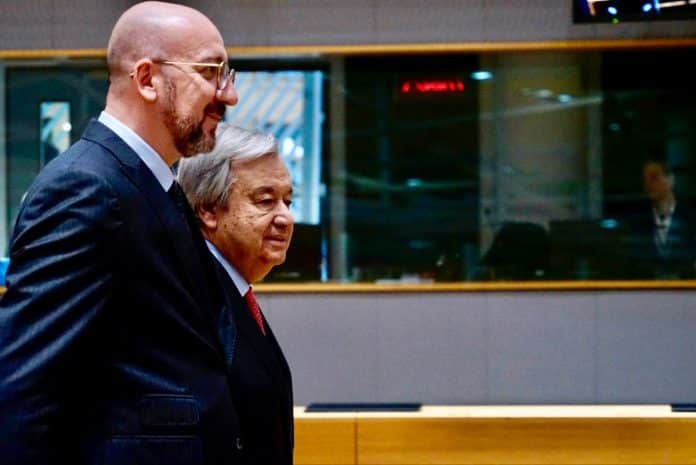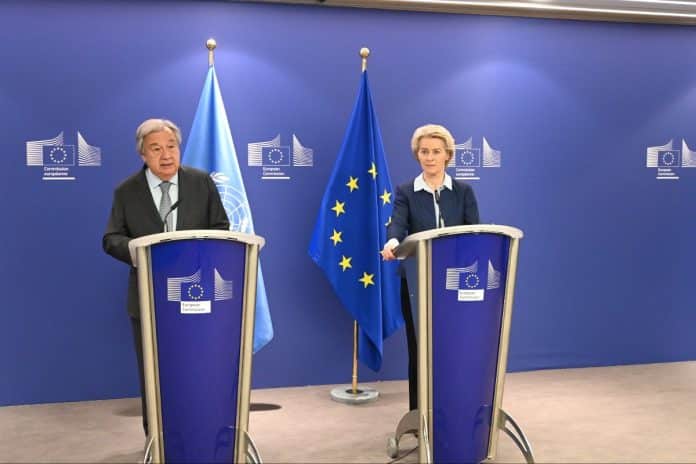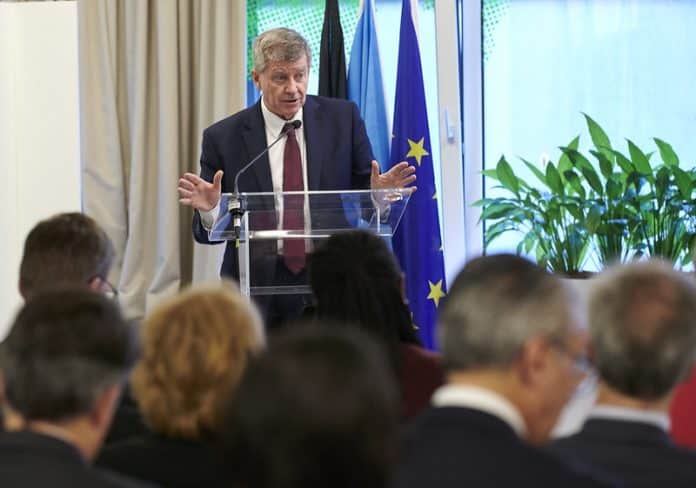The head of the United Nations was in Brussels from 20 to 22 March for a series of meetings with heads of state and government, European Union (EU) officials and Belgian ministers on the occasion of the European Council summit on 21 and 22 March.
On the agenda for discussion, as defined by the European Council: support for Ukraine in the face of Russia’s war of aggression, security and defence, the current situation in the Middle East, enlargement, external relations, migration, agriculture and the European Semester.
In a joint press statement with Mr Guterres on 20 March, Ursula von der Leyen, President of the European Commission, stressed that the current crises, “whether it is Ukraine or Gaza, Sudan or Haiti […] makes the cooperation between the European Union and the United Nations more important than ever before.” On the Israeli-Palestinian conflict, she said: “Gaza is facing famine. This is unacceptable. It is critical to achieve an agreement on a ceasefire rapidly now.”
UN chief: “We must act now” in Gaza
“We are meeting at a particularly dark moment when Europe’s role on the global stage is more important than ever,” said the UN Secretary-General. “In Ukraine, two years ago, Russia’s full-scale invasion has caused, and is causing terrible suffering, stoking global tensions, and undermining international law and the UN Charter.”
The UN chief again called for “just peace – and that means the respect of the sovereignty, the independence, the unity and the territorial integrity of Ukraine, within its internationally recognised borders.”
On the war in Gaza, Mr. Guterres repeated “Nothing justifies the abhorrent acts of Hamas on 7 October, and nothing justifies the collective punishment of the Palestinian people. Today, more than half of the population – over a million people – are facing catastrophic hunger, according to the scientific classification that was recently published. And so we must act now before it is too late.”
Reforming the system of global governance
In both these crises, he recalled, “the European Union is our steadfast ally in urging solutions in line with the UN Charter and international law. Beyond these wars, mistrust and division rule the day. Inequalities are rising. Climate change is wreaking havoc. And global frameworks are simply not up to the task. From the Security Council to the global financial architecture, we must transform international institutions so that they can respond to the challenges of our time and deliver for all – including the most vulnerable. Beyond these wars, mistrust and division reign supreme. Inequalities are growing.”
“Multilateralism and solidarity are in the DNA of the European Union. And many look to the EU as a leading force worldwide. We must stand together to silence the guns.”
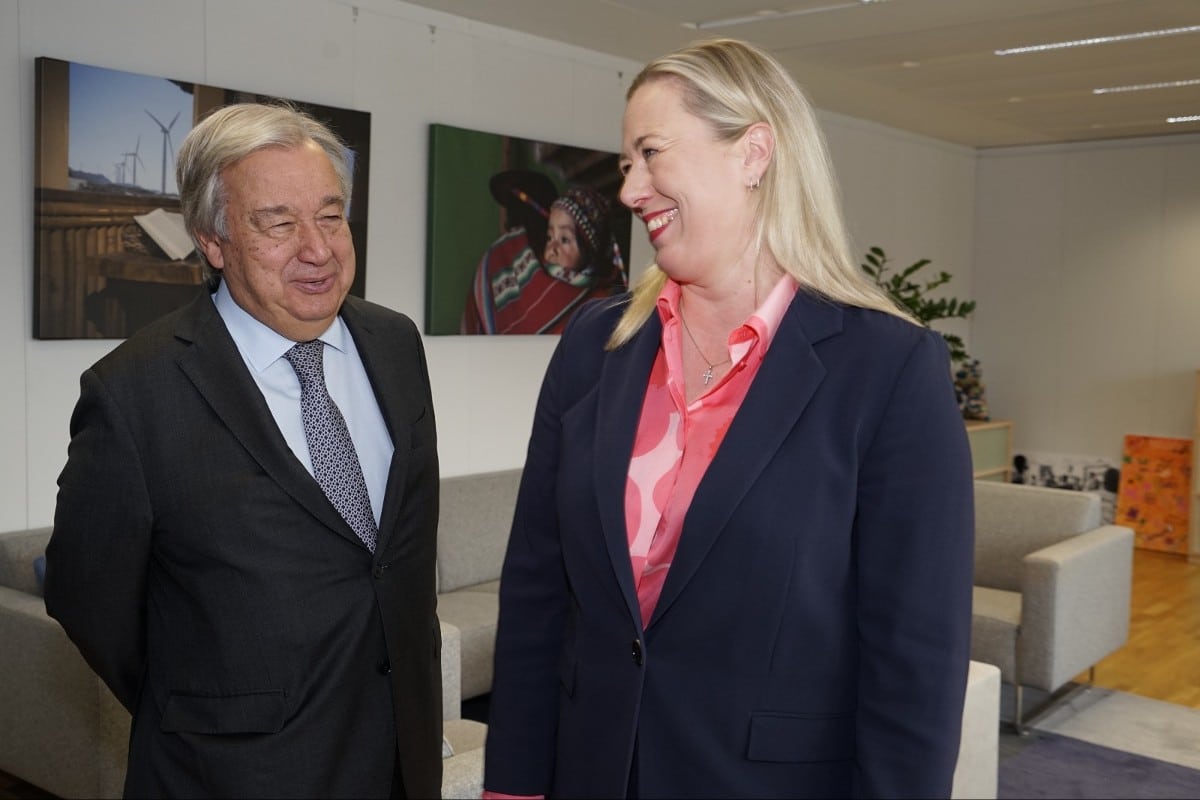
On 20 March, the Secretary-General met Jutta Urpilainen, the European Commissioner for International Partnerships, and the Belgian ministers Hadja Lahbib (Foreign Affairs) and Caroline Gennez (Development Cooperation).
On 21 March he also met with Roberta Metsola, the President of the European Parliament.
A “chaotic world” where impunity reigns
At the opening of the summit on 21 March, Charles Michel, President of the European Council, underlined in a joint press briefing with the Secretary-General that “the European Union and the United Nations share the same dream and the same ambitions, for a world based on cooperation, mutual respect and fundamental values”. He thanked the head of the UN for his “leadership”, particularly in the run-up to Summit of the Future.
António Guterres spoke of our “chaotic world” in which there is a “situation of impunity where any country or any armed group thinks that it can do whatever it wants, because there’s no accountability.”
Reaffirming fundamental principles without “double standards”
Drawing on the principles set out in the United Nations Charter, international law, the Geneva Conventions and international humanitarian law, as well as the Universal Declaration of Human Rights, the Secretary-General reiterated his call for “peace” in Ukraine and a “ceasefire” in Gaza. “As we condemned the attacks of the 7th of October and other violations of international humanitarian law by Hamas, we also condemned the fact that we are witnessing a number of civilian casualties in Gaza that is unprecedented in my times as Secretary-General.”
“The basic principle of international humanitarian law is the protection of civilians. We must uphold these principles in Ukraine and Gaza without double standards.”
Continuing on the subject of global governance, the Secretary-General declared that “we must push the world to move progressively into some orderly form of multipolarity with strong multilateral institutions.” He asserted that ” there is only one fundamental way to have a multipolar world. It is with the leadership of a strong and united European Union.”
He concluded by calling on the EU to “play a very active role in relation to the central questions, the existential questions, that threaten today’s world: Climate change, the uncontrolled development of artificial intelligence and the deep inequalities that we face.”
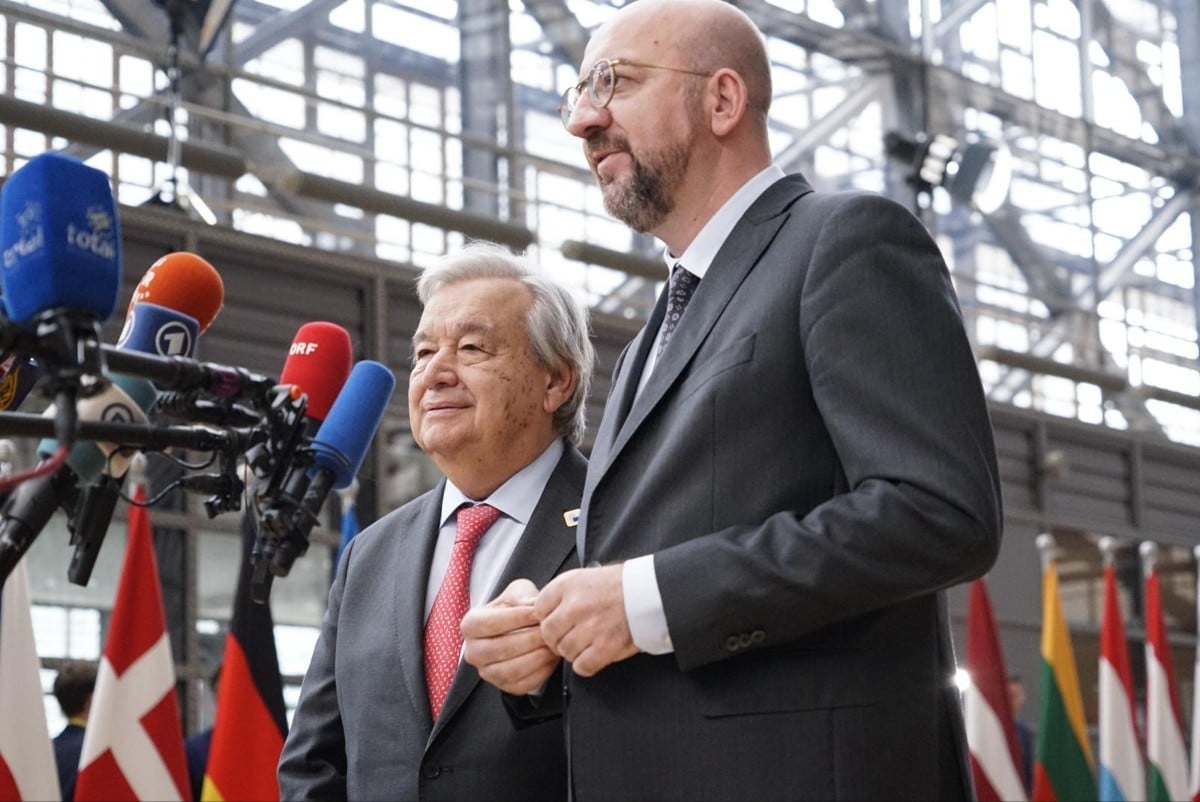
The EU calls for the first time with one voice for a ceasefire in Gaza
On 21 March, at the end of their first day at the European Council meeting, European leaders called for the first time with one voice for an “immediate humanitarian pause leading to a sustainable ceasefire” in Gaza, as well as the unconditional release of all hostages and access to humanitarian aid.
The EU leaders expressed their “their deep concern at the catastrophic humanitarian situation in Gaza and its disproportionate effect on children, as well as the imminent risk of famine caused by the insufficient entry of aid.”
They also urged Israel not to launch a large-scale ground offensive on Rafah, a town in the south of the Gaza Strip.
On the same day, 21 March, the United States presented a resolution to the Security Council also calling for a ceasefire, for the first time, and for an agreement between Israel and Hamas on the hostage-taking.
On the last day of his visit to Brussels, the Secretary-General visited the United Nations Regional Information Centre for Western Europe (UNRIC), which is celebrating its 20th anniversary. There he observed a minute’s silence in tribute to the victims of conflict and lighting a candle for peace.
Additional links:
- Secretary-General’s joint press encounter with the President of the European Council, Charles Michel – 21 March 2024 (United Nations)
- Remarks by President Charles Michel before the European Council meeting – 21 March 2024 (European Council)
- Secretary-General’s press encounter with the President of the European Commission, Ursula von der Leyen – 20 March 2024 (United Nations)
- Press statement by President von der Leyen with UN Secretary-General Guterres – 20 March 2024 (European Commission)

